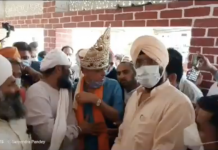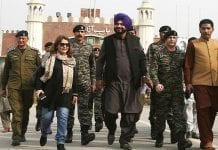Do you think the Narendra Modi government could extend Parliament by another few days to make Mumbai a separate state out of Maharashtra? Or carve Darjeeling out of West Bengal? Or suddenly, make Tamil Nadu a Union Territory? Do you think the government could put all politicians in Odisha under house arrest, cut all communication channels, impose a military lockdown, and suddenly declare it’s a Union Territory?



It was a midnight coup at 11 am. The ensuing darkness is ominous. This could just be the beginning of a long night for the democracy in India. The Modi government will just decide to do whatever it likes to the Constitution, to laws and regions and territories, and people’s lives. And, it will get away with it.
Home Minister Amit Shah declared Monday morning that Article 370 of the Indian Constitution is dead. Article 35A also goes. Ladakh is now a Union Territory without a legislature. The other two regions of the state, Jammu and Kashmir, will now be a Union Territory with a legislature — a bit like Delhi or Puducherry. The new Jammu and Kashmir government will thus be weaker than, say, the government of Goa. They say it’s national integration.
The ‘stakeholders’ be damned
In the days and months to come, there will be a lot of discussion on the legality of this move. Challenges in the Supreme Court are inevitable. There will be a lot of politics and polarization. India will be divided between those supporting and those opposing the move. But the most urgent issue is the manner in which this has been done, and the timing of it.
The BJP’s 2014 Lok Sabha election manifesto had said, “BJP reiterates its stand on the Article 370, and will discuss this with all stakeholders and remains committed to the abrogation of this article.” Re-iterating this promise in its 2019 manifesto, it removed the bit about holding discussion with the stakeholders.
The government notification says it is being issued in “concurrence with the government of Jammu & Kashmir.” That’s a joke, because the state has been under President’s rule. The assembly election there has been due for a while. The Election Commission did not hold it along with the Lok Sabha election for ‘security’ reasons. If they could put one EVM in the polling booth, why couldn’t they put two? Clearly, the Modi regime didn’t want an elected government in Jammu and Kashmir. It gets worse when you consider that governor Satyapal Malik has said on record that no constitutional change was on the cards, and if there was, he didn’t know.
Radical changes in a democracy must come through debate, discussion and dissent, which will lead to consensus. The Modi government should have tabled the bill at the beginning of the session, made it public that this is what it wants to do, listened to all voices, and then moved ahead with its plan – even if it didn’t agree with the naysayers.
Instead, the government decides to put former chief ministers under house arrest. These are the same Kashmiri politicians who stand up for India and take oath under the Indian Constitution. But the Modi government is changing the very idea of India, from unity in diversity to brute majoritarianism and authoritarianism.
In the 2014 Jammu and Kashmir election, the BJP had similarly put the abrogation of Article 370 in its manifesto. A BJP candidate in Srinagar, Hina Bhat, had then said: “If the Article is touched, it will force Kashmiris to pick up guns again. And you know I am a Kashmiri too.” When a PDP MP tears apart a copy of the Constitution of India in the Rajya Sabha, you know why consensus is a good word in democracy. It appears that we are no longer a democracy. Sanjay Gandhi would have approved.
If you are cheering this, do remember: you don’t know what the Modi government will change overnight and how it will affect you.
Curious timing
What is also curious is the timing of the move. Why could this not have been done before or after the Amarnath Yatra? The claim that the Amarnath Yatra was suspended because of a ‘terror threat’ now appears thin. It was obviously suspended as step one of a plan to put all of Kashmir Valley and parts of Jammu in a state of lockdown – no news, no phone, no internet, no right to assembly. Just stay at home, there’s no advance warning. In fact, the J&K governor and the Modi government were telling people not to panic. Those who took this advice seriously might now be worrying about stocking up on food. The curfews won’t go away soon.
The timing of the move is clearly to shift the headlines away from the economy. Kashmir, Kashmir, Kashmir will be what we will talk about for many weeks to come. The Modi government will not have to answer any tough questions about the economy anymore. Did demonetization lead to the slowdown? Is the GST still a mess? What is the government doing to arrest the shutting down of car manufacturing units that’s leading to massive job losses? The answer to all your questions about the economy is Kashmir.
It’s not that simple. The economy will worsen. There is no light at the end of the tunnel. The Modi government will need more to deflect attention. What’s next? Ram Mandir? National Register of Citizens across India? Political dissenters declared terrorists under the amended UAPA law?



